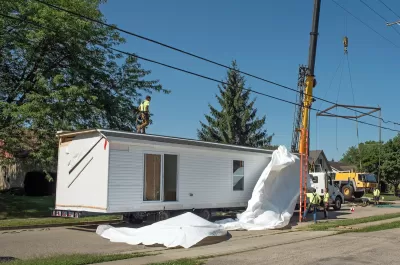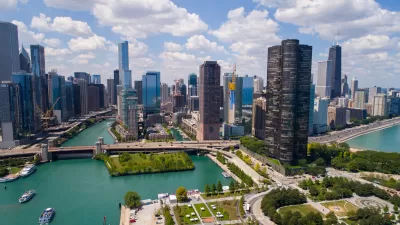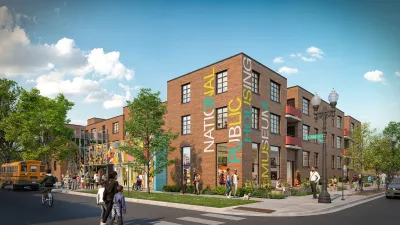Cheaper and faster to construct, modular homes provide an affordable alternative to traditional new construction for low- and moderate-income residents on Chicago’s South Side.

In November, the first of dozens of planned modular homes was constructed on a vacant lot in Roseland, a South Side neighborhood in Chicago. The project is part of the Reclaiming Communities initiative, which aims to revitalize the South Side by building 1,000 affordable homes, writes Emily Soto of local news organization WTTW.
Modular homes, which are built in segments elsewhere and then transported and assembled on site, are more affordable and faster to build than traditional new construction, though many local jurisdictions in the U.S. restrict or outright ban them.
Geoff Smith, executive director of the Institute for Housing Studies at DePaul University, told WTTW, modular homes are an innovative approach to generating homeownership for moderate- to low-income families.
“One of the key challenges that many historically disinvested communities face is a limited supply of move-in ready housing that’s also affordable for modest-income residents,” he said. He continued on to say, “[M]odular housing takes advantage of the sort of abundance of vacant lots and also creates a home that may be more affordable than other types of new construction.”
For Shenita Muse, executive director of the Hope Center Foundation, one of the organizations behind this initiative, told WTTW, “It is really about reclaiming our communities, revitalizing the city of Chicago … There are a number of residents that have been lost. Over 60,000 residents have moved out of the Far South Side, and so if we are to reclaim our communities and our neighborhoods, then we need to build homes.”
FULL STORY: Roseland Initiative Works to Promote Homeownership, Revitalize Communities Using Modular Homes

Montreal Mall to Become 6,000 Housing Units
Place Versailles will be transformed into a mixed-use complex over the next 25 years.

Planetizen Federal Action Tracker
A weekly monitor of how Trump’s orders and actions are impacting planners and planning in America.

Four Reasons Urban Planners Can’t Ignore AI
It’s no longer a question of whether AI will shape planning, but how. That how is up to us.

Bend, Deschutes County Move to Restrict Major Homeless Encampment
City and county officials are closing off portions of an area known as Juniper Ridge where many unhoused residents find shelter, hoping to direct people to housing and supportive services.

High Housing Costs Driving Down Transit Ridership in LA
When neighborhoods gentrify and displace lower-income residents, transit ridership suffers, new research shows.

Iowa Legalizes Accessory Dwelling Units
A new law will allow property owners to build ADUs on single-family lots starting on July 1.
Urban Design for Planners 1: Software Tools
This six-course series explores essential urban design concepts using open source software and equips planners with the tools they need to participate fully in the urban design process.
Planning for Universal Design
Learn the tools for implementing Universal Design in planning regulations.
City of Mt Shasta
City of Camden Redevelopment Agency
City of Astoria
Transportation Research & Education Center (TREC) at Portland State University
City of Camden Redevelopment Agency
Municipality of Princeton (NJ)
Regional Transportation Commission of Southern Nevada





























